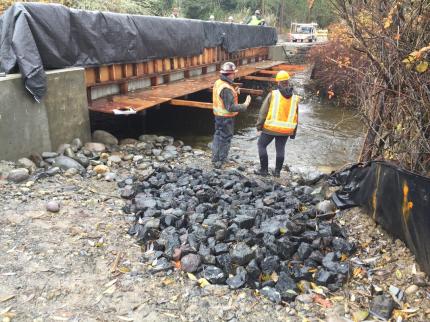
Washington State law (RCW 77.55) requires landowners, businesses, and government agencies to get a Hydraulic Project Approval (HPA) from the Washington Department of Fish and Wildlife (WDFW) before starting a construction project or other work activities in or near state waters.
HPAs are meant to ensure that construction or other work in or near a waterbody is done in a manner that protects fish and their aquatic habitats. However, this tool is only effective if people follow the approved plans and guidelines in their HPA.
Explore resources for fish-friendly hydraulic projects.
Site inspections
A compliance biologist may visit your site to ensure activities are following the project’s HPA requirements. We recognize that hydraulic code regulations are complicated, and we want to help you meet these requirements.
HPA noncompliance can have a profound impact on fish habitat, which is why compliance biologists work to help landowners and contractors identify and implement solutions to compliance issues.
When are compliance inspections performed?
Compliance biologists visit sites during construction and upon project completion to assess compliance with a project’s HPA requirements.
Not all project sites will be inspected. Compliance biologists focus on projects with the greatest potential to harm fish and their habitat.
Will I be notified before an inspection?
A compliance biologist will notify permittees by email or phone at least 24 hours before an inspection. Please inform the compliance biologist if you would like to be present during the inspection.
For safety reasons, the compliance biologist may ask questions about site access concerns or unrestrained pets or livestock that may be on the property.
What does the compliance biologist look for?
Different phases of construction dictate what is inspected. During construction, the compliance biologist may look at sediment controls and best management practices. Post construction, they verify the project or structure was completed as permitted in the HPA.
Will I be notified of inspection findings?
If your project is inspected, you will be notified by the compliance biologist. You can view the findings in your APPS account.
Resolving noncompliance issues
WDFW wants to help people comply with the law. In most instances when a violation is found, the compliance biologist will issue a Correction Request and provide support to the landowner or contractor to voluntarily correct it.
Preventing or correcting issues early in the project helps avoid damage to fish and their habitats and reduces construction costs as it is often more difficult to remove or redo a non-compliant structure.
When voluntary compliance does not occur, the compliance biologist may use a range of increasingly strict enforcement tools. These tools range from issuing a Notice to Comply or Stop Work Order, to a Notice of Penalty and, when appropriate, referring the incident to WDFW’s Enforcement Program for criminal prosecution.
Request an inspection
WDFW compliance biologists offer inspections by request, as time allows. A post-construction inspection can be useful to ensure your project was constructed per your HPA. Please send an inspection request to HPAapplications@dfw.wa.gov.
Contact
Hannah Faulkner, Compliance Division Manager
360-819-6527
hannah.faulkner@dfw.wa.gov